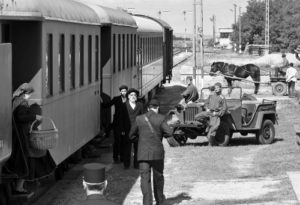It’s seems an impossible task, but somehow Hungarian filmmakers are figuring new ways to tell the stories of the Holocaust. First there was the Oscar-winning “Son of Saul,” which transported the viewer into the Holocaust as no other film has; now it’s “1945,” which screened last week at the Denver Jewish Film Festival. If you weren’t in the audience on Feb. 8, look out for this one when it comes to DVD/streaming, or to a theater.
The film reminded me, in tone and feel, of an American Western. Only in this case, it isn’t the outlaw riding into town — it’s the town folk who are the outlaws. When the Jews were deported one year earlier, the locals helped themselves to the Jews’ land, homes and belongings. One individual’s deportation is even facilitated by a local seeking a business opportunity.
The film is a subtle, slow build, with every detail carefully planted and sowed. It’s a depiction of humankind, from its purest impulses to its most base. Two Jews who return to this rural Hungarian village become the unwelcome conscience of the villagers. The filmmakers aren’t scared to explore how people grapple with their conscience when forced to.
I was transported back to the Hungarian town, Edeleny, where my great-grandmother was living when she passed away just as the Holocaust hit Hungary. Indeed, a Denver family from Edeleny told me after the film that its family returned from the Holocaust only to find their property there stolen by their former “neighbors.”
Aftermath isn’t a subject often explored. “1945” is changing that.
Shana Goldberg may be reached at [email protected]
Copyright © 2018 by the Intermountain Jewish News













